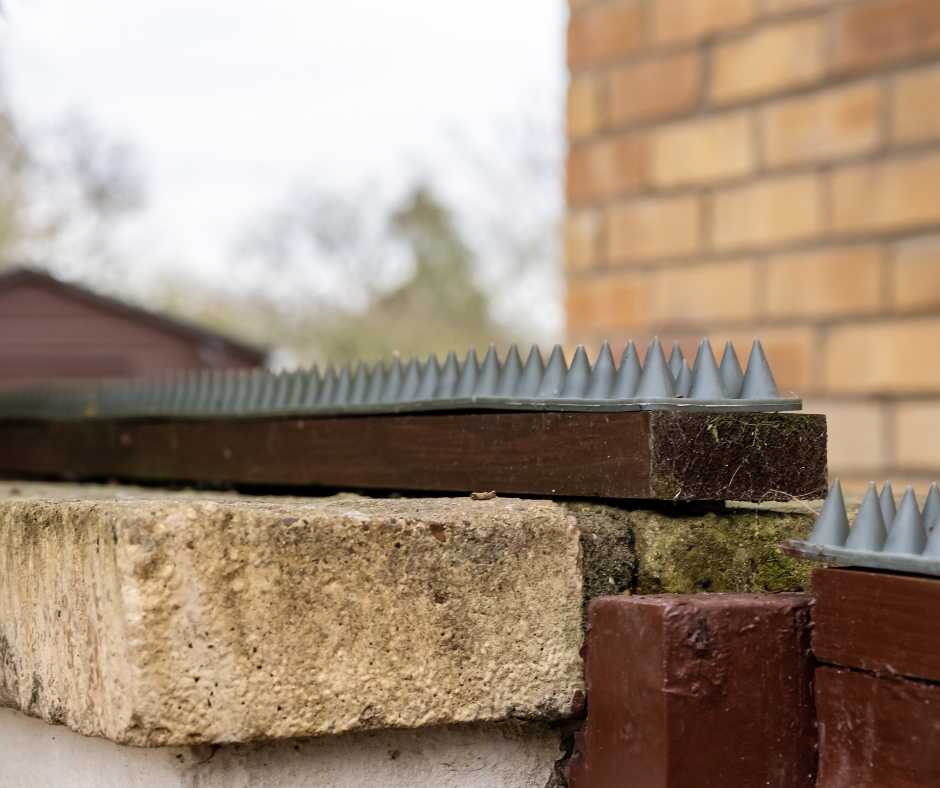For effective bird control, effective bird deterrents include humane options like bird spikes, netting, and laser systems like AVIX Autonomic Mark II. DIY solutions such as reflective discs and natural repellents also effectively deter birds while respecting wildlife laws and ethics.
This blog discusses ways to keep birds away by choosing best bird deterrent. We look at things like fences, sounds that birds don’t like, plants they stay away from, and even cool tech stuff. It’s all about finding a way to stop birds from bothering us while still being nice to them and nature.
Comprehensive Analysis of Bird Deterrent Types
We all love watching birds, but sometimes, we must keep them away from certain places. There are many intelligent and kind ways to do this, from barriers that block them to natural tricks that blend in with your garden.
Physical Deterrents for Effective Bird Control
Bird Spikes: Despite their scary name, bird spikes are safe and stop birds from landing on edges and roofs. The Audubon Society has lots of information on using them without hurting birds.
Netting and Mesh Barriers: These are great for protecting gardens and trees, making sure birds can’t get to places they shouldn’t without being mean. The National Wildlife Federation gives tips on how to set these up nicely.

Visual and Auditory Bird Deterrents: Tricks and Tips
Reflective Objects and Scare Devices: Things like shiny CDs or mirrors scare birds away with light. They’re simple but work well.
Ultrasonic and Sonic Repellents: These gadgets make sounds that birds don’t like, covering extensive areas without anyone noticing. Studies from the Cornell Lab of Ornithology explain why these sounds bother birds.
Natural and Eco-Friendly Deterrents
Predatory Decoys: Fake owls or hawks can make smaller birds think twice before visiting your garden. It’s a friendly way to keep them away.
Botanical Repellents and Garden Adjustments: Some plants don’t attract birds, so planting these can naturally keep your garden bird-free. Horticultural Magazine suggests which plants work best.
Using the right mix of these methods can create a space free of birds where you need it, all while being friendly to nature. Whether it’s fences, sound gadgets, shiny objects, or plant tricks, getting advice from experts like the Audubon Society, the National Wildlife Federation, and Horticultural Magazine can ensure your actions are helpful and kind.
Spotlight on Technology: Laser Bird Deterrents
Laser bird deterrents are a terrific new way to keep birds away from places they shouldn’t be, using technology that’s safe for the environment. These systems, like the AVIX Autonomic Mark II, use lasers that don’t hurt birds but make them want to stay away.
How Laser Deterrents Keep Birds Away
These lasers shoot light over extensive areas, making birds think something is blocking their way. This intelligent method covers a lot of space without messing up how an area looks or bothering people. The AVIX Autonomic Mark II is good at this, helping places like airports and farms keep birds away safely.
Using lasers to keep birds safe shows we’re thinking ahead about how to live well with wildlife, protecting our stuff and nature simultaneously.
DIY Solutions and Home Remedies for Bird Deterrence
Tackling bird deterrence doesn’t necessarily mean reaching for the latest gadgets. The most effective solutions are often crafted from everyday items around your home, turning them into eco-friendly deterrents for unwelcome avian guests.
Homemade Visual and Sound Deterrents
With a bit of creativity, you can create functional and decorative deterrents. Reflective discs made from old CDs or pieces of aluminum foil can be hung around your garden for visual scares. These discs catch the sunlight, producing glints that disorient and deter birds.
Similarly, creating wind chimes from unused cutlery or scrap metal adds auditory scares with their gentle clinking, doubling as an attractive garden feature.
Scarecrows offers a hands-on project with the dual benefit of deterring birds and engaging the whole family in crafting. Bright colors and frequent repositioning help mimic human presence, keeping birds at bay.

Natural Repellents: Spices and Essential Oils
The natural world provides potent bird repellents through spices and essential oils. Capsaicin, found in chili peppers, makes a powerful spray when mixed with water. This spicy solution, applied around the garden, is an effective bird repellent.
Essential oils such as peppermint, lavender, and lemongrass also deter birds when soaked into cotton balls and distributed throughout outdoor areas. These not only keep birds away but also leave your space smelling fresh.
These DIY approaches to bird deterrence allow for a harmonious coexistence with nature, emphasizing respect for wildlife while safeguarding your garden or patio. Next time you find birds too interested in your outdoor space, consider turning to these simple, homemade solutions for relief.
You may also read: What Smell Do Birds Hate
Making a Plan to Keep Birds Away
Making a good plan to stop birds from bothering different places requires considering what each place needs. It means developing unique ways to keep birds away from your home garden, big farms, or busy city places.
Different Ways for Different Places
Home Gardens and Patios: At home, you want to keep your garden looking pretty without birds messing it up. Things that shine or devices that make sounds birds don’t like can keep them away without ruining the look of your garden. Picking plants that birds don’t like can also help keep your patio calm and bird-free.
Farms and Big Fields: Farms need vital ways to stop birds because there’s a lot of space and food birds like. Putting nets over trees or mixing sounds with fake predators can help keep birds away from the crops. Trying new things, like planting crops for birds, can keep them away from the ones you want to save.
City and Factory Areas: You need different ideas in cities and big workplaces. Spikes on buildings stop birds from sitting there, and unique light beams can keep them away from significant areas without getting in the way. Parks in the city can use certain plants and less water not to attract birds.

By understanding what each place needs, you can make a plan that works well to keep birds away. This way, you help keep the place working well and looking good without being mean to the birds. The goal is to live together in peace.
How to Keep Bird Deterrents Working Well
Ensuring bird stoppers work for a long time means setting them upright and checking them often. Here’s how to do it:
Setting Things Up Right
Getting bird stoppers to work starts with how you put them in place. You need to make sure they cover the area well for things like spikes and nets. Spikes should be close together so birds can’t land, and nets should be tight so birds can’t escape. Things that shine or make noise need to be where the sun can hit them or where they can send their sounds all around.
Always follow the directions that come with them, and think about what birds you see around your place to make them work better.
Keeping Them Working
Checking your bird stoppers often is critical to keep them working. If you have spikes or nets, look for any spots that are broken or coming loose. If you’re using gadgets that need batteries or to be plugged in, make sure they have power and are working right. Clean things that need to shine to keep them bright.
As the year goes on, birds might act differently, like looking for places to make nests in the spring. You might need to use your bird stoppers more or move them to new spots. Watch what the birds are doing and change your plan as needed.
Staying on top of these things means birds will find somewhere else to go, keeping your space nice and quiet.
Legal and Ethical Considerations in Bird Control
When it comes to keeping birds away, we’ve got to think about what’s fair and follow the rules. Birds are crucial to nature, and we must ensure we’re not hurting them when we try to keep them from places they shouldn’t be.
Wildlife Protection Laws and Regulations
There are lots of laws out there to keep birds safe. In places like the United States, there’s a law called the Migratory Bird Treaty Act that says you can’t bother or hurt birds unless you have special permission. These rules are all over the world because everyone wants to ensure birds are okay.
The U.S. Fish and Wildlife Service has a bunch of info on how to keep birds away without breaking any laws.
Ethical Practices in Deterrence
The best way to keep birds away is to do it nicely. That means using stuff like noisemakers and shiny things or changing your garden, so birds decide to go elsewhere. This way, we’re not hurting the birds and still following the rules.
Choosing gentle ways to keep birds away shows that we care about animals and the environment. It’s all about finding ways to live together without causing problems for the birds or us.

People Also Asked
What is the most effective bird deterrent?
Effectiveness varies by situation, but combining physical, visual, and auditory deterrents tends to cover all bases.
How can I keep birds away naturally?
Using decoys, reflective items, and planting deterrent plants are great natural strategies.
Do ultrasonic bird repellents work?
Yes, especially in open spaces, but their effectiveness can diminish if birds get accustomed to the sound.
Can I use reflective tape to deter birds?
Absolutely! Reflective tape is an easy and inexpensive method to scare birds away.
How do I prevent birds from nesting on my property?
Implementing deterrents before nesting season starts is key. Spikes, nets, and regular inspections can prevent birds from settling down.
Wrap Up
Picking the best way to keep birds away means finding a balance. You can watch birds without letting them mess up your space. There are many friendly options out there. You can use things like bird spikes or nets. Or, you can go for something modern like the AVIX Autonomic Mark II laser.
If you like making things yourself, making bird deterrents at home can also work well. The main thing is to be friendly to the birds, follow the rules, and ensure we all get along well.






